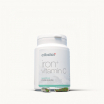What vitamin deficiency causes you to feel cold
Published:
Feeling unusually cold all the time can be frustrating and concerning. While environmental factors like cold weather can leave you shivering, feeling cold indoors or during warmer seasons may indicate an underlying health issue - specifically, a vitamin deficiency.
Contents:
- Vitamin B12 Deficiency Can Lead to Feeling Cold
- Iron Deficiency Can Make You Feel Frigid
- Vitamin B9 (Folate) Deficiency Can Leave You Feeling Icy
- Vitamin C Deficiency Can Lead to Feeling Cold
- Vitamin D Deficiency Can Lead to Cold Hands and Feet
- Check for Nutrient Deficiencies if You Feel Cold Frequently
- Key Points to Remember
- Q: What vitamin deficiency causes you to feel cold?
- Q: Can low vitamin levels make you feel cold?
- Q: What are the symptoms of vitamin deficiency that can cause you to feel cold?
- Q: Can a certain vitamin deficiency cause cold sensitivity?
- Q: How does a vitamin deficiency make you feel cold?
- Q: What vitamin helps make you feel warmer?
- Q: What are some sources of vitamin B12?
- Q: Can severe vitamin deficiencies cause you to feel cold?
- Q: How does a vitamin deficiency affect your body temperature?
- Q: Can a lack of vitamin D make you feel colder?
Certain vitamins play crucial roles in regulating body temperature and keeping you feeling cozy and warm. When you don't have enough of these essential nutrients, it can cause symptoms like cold hands and feet, feeling chilled, and an inability to get warm.
Read on to learn more about how vitamin deficiencies can cause cold sensitivity and make you feel frigid even when you're bundled up.

Vitamin B12 Deficiency Can Lead to Feeling Cold
Vitamin B12 is an essential nutrient that helps your body produce enough red blood cells. Red blood cells carry oxygen throughout the body - without enough of them, you may feel unusually cold.
Vitamin B12 deficiency is one of the most common vitamin deficiencies, affecting up to 15% of people. It can cause a condition called pernicious anemia, which leaves you lacking enough red blood cells.
Common causes of vitamin B12 deficiency include:
- Not getting enough vitamin B12 from diet or supplements
- The body's inability to properly absorb vitamin B12
- Certain medical conditions that affect vitamin B12 absorption
Low vitamin B12 levels may lead to inadequate oxygen delivery and circulation, leaving your hands and feet feeling like ice. Other symptoms of vitamin B12 deficiency include fatigue, pale skin, shortness of breath, and numbness or tingling.
Treating vitamin B12 deficiency involves supplementing with vitamin B12 shots, nasal spray, or oral supplements. Consuming vitamin B12 rich foods like meat, eggs, and dairy can also help restore levels.
Iron Deficiency Can Make You Feel Frigid
Iron is another nutrient that helps produce red blood cells that carry oxygen. Iron deficiency is the most common nutritional deficiency worldwide, often manifesting as iron deficiency anemia.
When your body lacks iron, it cannot produce enough hemoglobin and red blood cells. This hampers your blood's oxygen-carrying abilities, which can leave your extremities feeling cold.
Along with feeling chilly, common symptoms of iron deficiency include:
- Fatigue and weakness
- Pale skin
- Headaches
- Poor concentration
- Shortness of breath
- Rapid heartbeat
Those at highest risk for iron deficiency include women of childbearing age, pregnant women, infants, and vegetarians. Heavy menstrual bleeding raises women's risk of deficient iron levels.
Boosting iron intake through diet and supplements helps treat iron deficiency. Consuming iron-rich foods like meat, seafood, nuts, beans, and fortified cereals can help restore levels. Those with severe deficiencies may need intravenous iron injections.
Vitamin B9 (Folate) Deficiency Can Leave You Feeling Icy
Vitamin B9, also known as folate, is a B vitamin that helps the body produce red blood cells. Since red blood cells transport oxygen, a deficiency in vitamin B9 can hamper circulation and leave you feeling chilled.
Causes of vitamin B9 deficiency include:
- Diet low in fruits, vegetables, and enriched grains
- Medical conditions affecting nutrient absorption
- Certain medications
- Alcohol abuse
In addition to feeling abnormally cold, folate deficiency symptoms include fatigue, weakness, headaches, heart palpitations, and tingling in the hands and feet.
Folate deficiencies are treated by consuming more folic acid through fortified foods, supplements, or folic acid injections. Pregnant women have increased folate needs and should take a prenatal vitamin to prevent deficiency.
Vitamin C Deficiency Can Lead to Feeling Cold
Vitamin C is an antioxidant vitamin that plays many important roles in the body. One of its functions is supporting immune health and fighting inflammation.
Without enough vitamin C, you may feel extra sensitive to cold temperatures. Even mild vitamin C deficiency can leave you feeling chilly and shivery.
Common causes of vitamin C deficiency include:
- Inadequate dietary intake of fruits and vegetables
- Smoking cigarettes (depletes vitamin C levels)
- Certain medical conditions that increase vitamin C needs
Along with cold sensitivity, symptoms of vitamin C deficiency include frequent infections, fatigue, swollen and painful joints, slow wound healing, and anemia.
Getting enough vitamin C through citrus fruits, peppers, broccoli, strawberries and supplementing helps restore levels. The recommended daily intake is 75-90 mg for adults.
Vitamin D Deficiency Can Lead to Cold Hands and Feet
Known as the “sunshine vitamin,” vitamin D plays a major role in regulating calcium absorption and supporting bone health. It also affects circulation and can leave you feeling icy when deficient.
Vitamin D deficiency is extremely common, affecting around 40% of adults. Causes include:
- Lack of sun exposure
- Obesity
- Certain medical conditions
- Digestive disorders affecting nutrient absorption
Since vitamin D aids calcium absorption, deficiency can cause numbness and tingling in the hands and feet. Poor circulation caused by vitamin D deficiency can leave your extremities feeling extremely cold.
Other symptoms include frequent infections, fatigue, bone/muscle pain, and mood changes. Getting adequate sun exposure, eating vitamin D foods like fatty fish and egg yolks, and supplementing helps boost levels.
Check for Nutrient Deficiencies if You Feel Cold Frequently
If you feel chilly all the time, even when you're bundled up and indoors, it may be a sign that you're deficient in essential vitamins. Nutrient deficiencies like iron, vitamin B12, folate, vitamin C, and vitamin D can disrupt red blood cell production, circulation, immunity, and nerve function.
Be sure to eat a balanced diet with ample nutrients. Take a high quality multivitamin to cover any gaps. Stay vigilant about cold sensitivity and other deficiency symptoms and see a doctor if they persist. Treating any underlying vitamin deficiencies can help you feel warmer and more comfortable.
Key Points to Remember
- Vitamin deficiencies can cause symptoms like feeling cold, having icy hands and feet, and shivering even when warm.
- Vitamin B12, iron, folate, vitamin C and vitamin D deficiencies may lead to cold sensitivity.
- These nutrients help produce red blood cells, support circulation, regulate immunity, aid nerve function, and absorb calcium.
- Low levels hamper oxygen delivery, leaving you feeling chilled.
- Eat a nutritious diet, take supplements, and see a doctor for cold symptoms that won’t go away.
- Restoring deficient nutrient levels through diet, sunlight, and supplements can help you feel cozy and warm again.
Q: What vitamin deficiency causes you to feel cold?
A: Vitamin deficiencies can cause you to feel cold. Specifically, a deficiency in certain vitamins, such as vitamin D or vitamin B12, may result in cold intolerance or feeling cold all the time.
Q: Can low vitamin levels make you feel cold?
A: Yes, low vitamin levels, particularly low vitamin D levels, can make you feel colder. Vitamin D is an important vitamin that your body needs to maintain proper body temperature. A lack of vitamin D in your body may cause you to feel chilly even in relatively warm environments.
Q: What are the symptoms of vitamin deficiency that can cause you to feel cold?
A: Symptoms of vitamin deficiencies that can cause you to feel cold include cold intolerance, feeling cold all the time, and cold and clammy extremities. If you are experiencing these symptoms, it is important to consult with a healthcare professional to determine if you have any deficiencies.
Q: Can a certain vitamin deficiency cause cold sensitivity?
A: Yes, certain vitamin deficiencies, such as vitamin D deficiency or magnesium deficiency, can cause cold sensitivity. When your body lacks these important vitamins, it may affect your body's ability to regulate temperature properly, leading to increased sensitivity to cold.
Q: How does a vitamin deficiency make you feel cold?
A: When your body lacks the necessary vitamins, it can impact various bodily functions, including your body's ability to maintain a normal body temperature. This can result in feeling colder than usual, experiencing cold intolerance, or feeling cold all the time.
Q: What vitamin helps make you feel warmer?
A: Vitamin D is known as the "sunshine vitamin" and is an important vitamin that your body needs. It helps your body absorb calcium and plays a role in maintaining proper body temperature. Adequate levels of vitamin D can help you feel warmer and more comfortable in colder environments.
Q: What are some sources of vitamin B12?
A: Vitamin B12 is found in animal-based foods, such as meat, fish, eggs, and dairy products. It can also be obtained through supplements or fortified foods. Including these sources in your diet can help ensure you're getting enough vitamin B12 to prevent deficiencies that may contribute to feeling cold.
Q: Can severe vitamin deficiencies cause you to feel cold?
A: Yes, severe vitamin deficiencies can cause various health issues, including feeling cold. It is essential to maintain adequate vitamin levels in your body to support proper bodily functions and maintain optimal body temperature.
Q: How does a vitamin deficiency affect your body temperature?
A: When your body lacks certain vitamins, it can disrupt the balance of essential processes, including regulation of body temperature. This can result in feeling colder than normal, experiencing cold sensitivity, or having difficulty maintaining a comfortable body temperature.
Q: Can a lack of vitamin D make you feel colder?
A: Yes, a lack of vitamin D can make you feel colder. Vitamin D is a fat-soluble vitamin that your body absorbs through the skin when exposed to sunlight. Insufficient exposure to sunlight or low levels of vitamin D in your body can contribute to feeling colder than usual.
Resources used to write this article
National Institute of Diabetes and Digestive and Kidney Diseases. "Vitamin B12 Deficiency Anemia." August 2022. https://www.niddk.nih.gov/health-information/blood-diseases/vitamin-b12-deficiency-anemia
National Heart, Lung, and Blood Institute. "Iron Deficiency Anemia." July 2021. https://www.nhlbi.nih.gov/health-topics/iron-deficiency-anemia
MedlinePlus. "Folate deficiency." October 2022. https://medlineplus.gov/ency/article/000354.htm
Scott, Elizabeth. "Vitamin C Deficiency." Healthline. March 2018. https://www.healthline.com/health/vitamin-c-deficiency
NHS. "Vitamin D Deficiency." October 2020. https://www.nhs.uk/conditions/vitamins-and-minerals/vitamin-d/


















